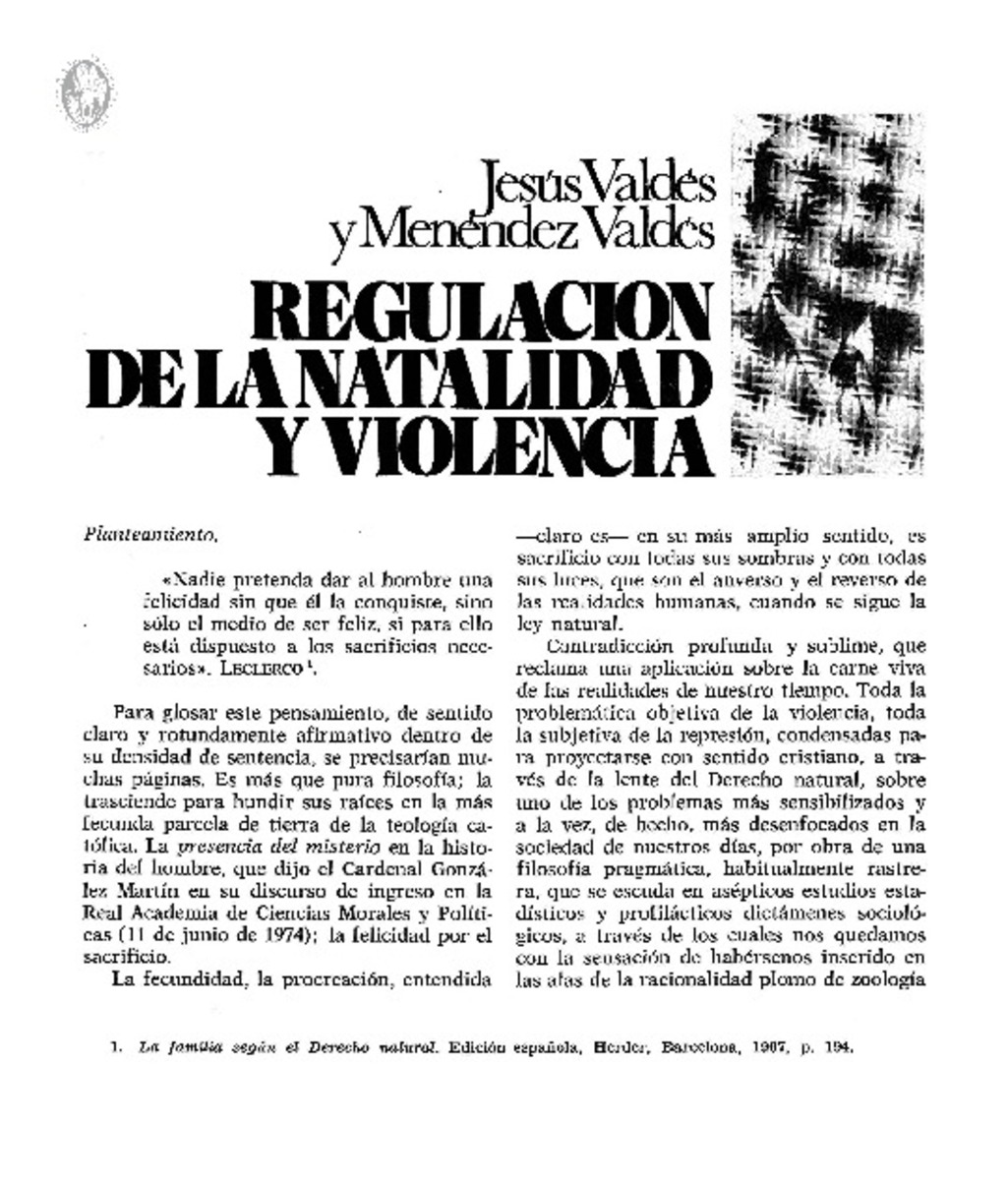Full metadata record
| DC Field | Value | Language |
|---|---|---|
| dc.creator | Valdés-y-Menéndez-Valdés, J. (Jesús) | |
| dc.date.accessioned | 2010-09-13T08:27:33Z | - |
| dc.date.available | 2010-09-13T08:27:33Z | - |
| dc.date.issued | 1974 | - |
| dc.identifier.citation | Valdés y Menéndez Valdés, Jesús. ""Regulación de la natalidad y violencia"". Persona y Derecho, 1 (1974) : 223-265. | es_ES |
| dc.identifier.issn | 0211-4526 | - |
| dc.identifier.uri | https://hdl.handle.net/10171/12154 | - |
| dc.description.abstract | Ours is a period marked by violence, and, most important, it is no stranger either to reproduction. In arder to clarify concepts, by violence we mean, formally speaking, any interference or action by an external agent on a situation, structure, phenomenon or process with the object of nullifying it or of changing either its meaning (by deviation) or its intensity (by slowing it down or by accelerating it). In this sense violence is not intrinsically illicit. One must distinguish between violen ce and violation. After a short study of the concepts of law, order and justiee in the fundamental works of the principal Natural Law investigators of the present day, the author arrives at the conclusion that the genuine meaning of the term violation is any attempt against a principie of order, either directly of by undermining any of the other elements of order, be they real or related. The human vocation of dominion over Nature, insofar as Man is a superior being, should not be thought of in absolute terms: it consists in being responsible for the conservation, reproduction, development and perfection of all creatures that tend towards their completeness according to individual ends which integrate themselves progressively towards one general goal. For this mission, which in general terms is called culture, man has a certain autonomy, but not full independence; and the degree of autonomy is much more reduced with respect to his own species than in the case of inferior creatures. Man's capacity and his science can suffer desviations. Insofar as biology is concerned, these presentday desviations are serious and well known. The attempt against the physical and natural order, especially in the animal sphere, is widespread and threatens to obtain firm footing. In this sense, we see that violence is being used, not in its I awfu I (and at times necessary) meaning of correction, of restoration of order, but as its violation. The author has confined his examination of the problem to the question of human population: he discusses three fundamental aspects: prostitution 01 the biological culture, separation 01 erotic appetite and reproduction, conflict between individual rights and social interests. The «scientific» attempts against the reproductive processes, including those previous to gametogenesis as well as the actual fertilization, are classified together under the heading of contraception. Both aspects are studied extensively and the author concludes that they are unlawful according to the Natural Law. The arguments of the proponents of contraception are studied and compared with those of their opponents, and special importance is given to biological and philosophical considerations; the conclusion is that no jurist with proper regard for legal considerations can accept theories that contradict authority and that can well be classified as setting precedents, especially when the matter is undergoing research. The author examines the various present-day aspects of the -sexual revolution » as a key to explaining the many postulates and tendencies as well as the possible collision between individual rights and group interests. The question of continence and Chastity are next examined. The discussion of human reproduction oscillates today between the two poles of «biological» and «scientific» arguments, with considerations regarding the meaning and limitations of these expressions and their consequences and applications. This is followed by a short analysis of the pragmatic attitude adopted by various politicians in their approach to these questions. After sorne short reflections on the limitations of human freedom implied by the present attitude towards the sexual revolution, the author makes a final conclusion in which he refers to self-control. | es_ES |
| dc.language.iso | spa | es_ES |
| dc.publisher | Servicio de Publicaciones de la Universidad de Navarra | es_ES |
| dc.rights | info:eu-repo/semantics/openAccess | es_ES |
| dc.subject | Materias Investigacion::Derecho | es_ES |
| dc.title | Regulación de la natalidad y violencia | es_ES |
| dc.type | info:eu-repo/semantics/article | es_ES |
| dc.identifier.doi | 10.15581/011.32836 | es_ES |
Files in This Item:
Statistics and impact
Items in Dadun are protected by copyright, with all rights reserved, unless otherwise indicated.






